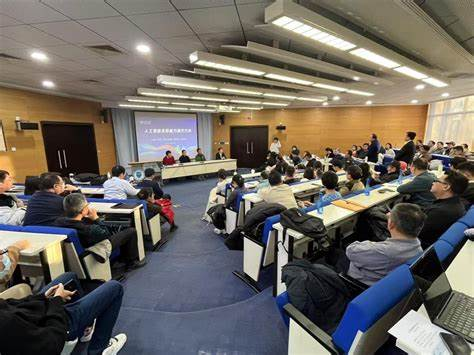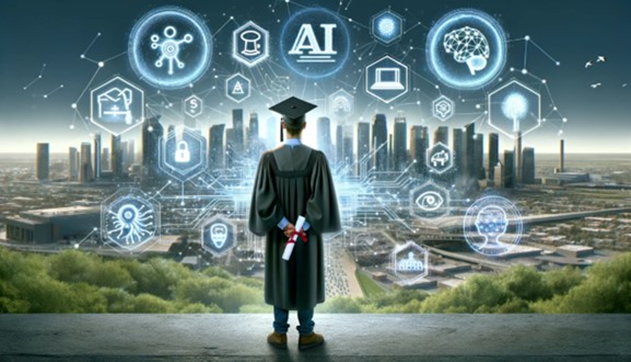The McDonaldisation of higher education in the age of AI
Input
Modified
Sociologist George Ritzer created the word "McDonaldization" to describe how concepts from fast-food chains—efficiency, calculability, predictability, and control, or ECPC—have permeated many aspects of society. Teaching, learning, and administration are undergoing a fundamental revolution as a result of these concepts being increasingly embedded in higher education in the age of artificial intelligence (AI).

One characteristic that sets AI-driven education apart is its effectiveness. Tools that automate curriculum distribution and assessment include Gradescope, Blackboard Learn, and Coursera. This reduces instructor workload and improves scalability. AI-powered analytics, which allows educational institutions to measure learning results, productivity, and student retention, are an example of calculability. Standardized online courses provided by companies like edX and Coursera ensure constant distribution of content, but they frequently lead to a loss of diversity in viewpoints. These classes are blatantly predictable. Lastly, while monitoring systems like Respondus Monitor and Proctorio are used to ensure academic integrity, they also bring up moral questions about privacy and impartiality.
Even though AI increases accessibility and efficiency, it also has the potential to turn education into a transactional experience where the focus is moved from intellectual growth to measurable performance indicators. This change is congruent with McDonaldization, a process that dehumanizes learning by standardization and automation, turning it into a quantitative and predictable routine instead of an intellectually stimulating adventure.
AI's effects on higher education are marked by both possibilities and challenges. Institutions are incorporating AI to improve administrative effectiveness, streamline educational procedures, and increase educational accessibility. However, these benefits come with significant trade-offs that impact student engagement, creativity, and ethical considerations.
Examples of adaptive learning systems that use artificial intelligence to tailor instructional materials based on student performance are DreamBox and Smart Sparrow. While this increases productivity, it may also perpetuate a calculability mindset, which reduces learning to a data-driven process that puts results ahead of deep intellectual engagement. Algorithmic decision-making streamlines academic advising, admissions, and course scheduling, leading to more dependable and effective procedures. However, an excessive dependence on AI-powered decision-making limits human judgment and reduces intricate educational choices to inflexible, mechanical judgments. Examples of generative AI technologies that support writing, research, and teaching are ChatGPT and Jasper AI. Even if they increase productivity, they pose serious concerns because they undermine the critical thinking abilities and one-on-one mentoring that are essential elements of transformative education.
AI puts quantifiable results, like exam scores and completion rates, ahead of creativity, moral judgment, and social skills. Instead of encouraging a thorough intellectual development, this narrow concentration could turn education into a number exercise. Furthermore, AI-driven automation weakens the bonds between teachers and students, which are crucial for mentoring and intellectual discussion. Despite its efficiency, automated evaluation and feedback fall short of traditional teaching in terms of nuance and individualized attention. Artificial intelligence-driven surveillance tools also violate privacy and autonomy. Concerns regarding equity and justice are raised by the extensive usage of programs like Proctorio, which disproportionately affect students from various backgrounds.

These conversations reveal a range of opinions about AI's potential in higher education, from hope to concern about its dehumanizing consequences. Proponents of AI in education argue that automation fosters creativity, productivity, and accessibility. AI is seen as a way to democratize education by institutions that integrate it into their research, student services, and courses. To educate students for businesses driven by artificial intelligence, universities are increasingly offering courses on AI ethics. Additionally, AI-powered research tools speed up the creation of new technologies in fields like genetics and historical text analysis.
Furthermore, others argue that AI literacy is a critical skill for the workforce of the future. As AI changes employment markets, students who are skilled in data analysis, AI-assisted research, and prompt engineering will have an advantage. However, detractors warn that AI-driven standardization has the unintended consequence of devaluing innovation and critical thinking. They argue that education is more about intellectual discovery than it is about efficacy. They fear that by emphasizing uniformity and speed over depth and uniqueness, McDonaldization is undermining the humanistic nature of education.
As AI automates knowledge-based jobs, there is serious concern about the declining value of higher education. "Educated but Unemployed: Will AI Make Your College Degree Meaningless?" is a Reddit topic that highlights worries about AI's ability to replace white-collar workers, especially in writing, design, and marketing. AI-driven automation is predicted to reduce the number of career options available to professionals with a degree, raising widespread concerns that the economic sustainability of education may be jeopardized.
According to many academics, artificial intelligence (AI) compromises academic integrity by making cheating invisible. Unlike typical plagiarism, AI-generated solutions adapt to the subtleties of the course, making them nearly impossible to detect. Because AI-detection techniques often produce false positives and negatives, their dependability is called into doubt, raising questions about the objectivity of academic assessments. In addition, there is a great deal of disagreement over the analogy between calculators and artificial intelligence (AI). Calculators help people who already understand mathematical concepts, but AI discourages autonomous thinking by replacing cognitive effort. John Stuart Mill's educational philosophy holds that real learning comes from intellectual engagement and comprehension rather than just artificial intelligence processing information.
The next challenge is integrating AI responsibly while upholding education's revolutionary aim. To avoid the pitfalls of McDonaldization, educational institutions must strike a balance between human-centered learning strategies and technology developments. Human-centered learning should be given top priority when implementing ethical AI to make sure that it complements rather than replaces critical thinking, creativity, and social interaction. AI must be integrated into interdisciplinary courses that integrate technical knowledge with ethics and philosophy in order to encourage responsible AI use. To ensure academic integrity, diversity, and impartiality, colleges should establish clear norms surrounding the usage of AI. Furthermore, rather than replacing traditional educational paradigms, AI must be used in conjunction with them. Project-based learning, experiential learning, and mentoring must all remain crucial elements of higher education.
Higher education has both potential and risks as a result of the McDonaldization effect of AI. Institutions must put equity, innovation, and human connection first even when artificial intelligence (AI) increases productivity, accessibility, and scalability. The careful incorporation of AI, which must be utilized as a tool for intellectual empowerment rather than as a means of standardization, is essential to the future of education. A successful future depends on interdisciplinary curriculum that combine AI with ethics and the humanities, open AI policies that ensure equitable and responsible AI use, and balanced AI integration that maintains relational engagement and deep learning. Universities must make sure AI complements rather than replaces the core educational ideals of critical thinking, ethical reasoning, and intellectual curiosity if they hope to ensure that higher education continues to be a transformational and meaningful experience.





















